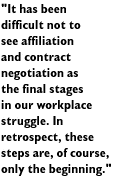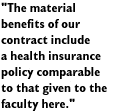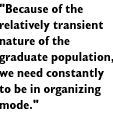

Organizing After the COGS
Union Affiliation Vote
|
1. On April 16, 1996, the graduate employees at the University of Iowa voted to affiliate with the United Electrical, Radio, and Machine Workers of America (UE). For the graduate employees here who had been active in COGS (Campaign to Organize Graduate Students, www.cogs.org), this affiliation vote represented the end of a three-year struggle for representation at the University. Union affiliation also insured us the right to sit down at the table with the Board of Regents and the University administration and negotiate a legally-binding contract. 2. For those of us who have been involved in the organizing effort here, it has been difficult not to see affiliation and contract negotiation as the final stages in our workplace struggle. In retrospect, these steps are, of course, only the beginning. As both a union and as individual workers we have begun to interrogate what unionization means for us above and beyond affiliation and contract negotiation and what the role of the union is during non-negotiation years. We have also become aware of how the struggle here relates to other labor struggles--both within the academy and without. 3. In response, the organizing that is going on in our local has had to evolve as well. In this article, I would like to address the evolution of our organizing efforts in the shift from the campaign to organize a union local to the maintenance and strengthening of an established local. While I will discuss our campaign and our contract in some detail, I will focus primarily on the organizing efforts since the negotiation and ratification of our first contract during the academic year 1996-1997. 4. The contract between COGS-UE Local 896 and the Iowa State Board of Regents, which went into effect July 1, 1997, has significantly changed what it means to be a graduate employee here at the University of Iowa. Six months later, the material and symbolic effects that these changes have had not only on the graduate population but on the undergraduates and the faculty as well are just beginning to be realized. The material benefits of our contract include a health insurance policy comparable to that given to the faculty here, a legally-binding grievance procedure, protections against overwork, and a 6% raise over the next two years. The contract also includes raises in the base salary to $12,778.00 for the 1997/98 academic year and $13,320.00 for the 1998/99 academic year for 50% appointments. 5. The COGS contract also means that the University has been forced to acknowledge that what we do as research assistants and teachers is an integral and significant part of the University. For many of us here, this has meant that we have a renewed sense of dignity about our work as teachers and researchers. It has influenced how we view our place in this university and the American academy as a whole. Given the continued attacks against academic workers in the form of the dissolution of tenure, debates about faculty-student contact hours, the growing use of adjuncts and part-timers, and the erosion of the liberal arts curriculum in favor of a more cost effective form of higher education--both around the nation and in the state of Iowa--the symbolic force of our contract cannot, in my opinion, by overestimated. 6. As a result, our organizing campaign has had to address both the material and the symbolic changes that result from a union presence on the campus. In the past year, we have centered our organizing campaign around education and consciousness-raising regarding the contract, workplace grievances, and other issues of social justice. Before continuing with a discussion of our organizing techniques, however, I would like to turn to a brief discussion of Iowa labor law and how that has affected our organizing campaign. 7. Iowa is a "right to work" state. This means that even though employees vote to affiliate with a union, they are not required to join the union nor are they required to pay fair share dues. Needless to say, this means that organizing in the state of Iowa is an uphill battle. Moreover, given the fact that most academics do not identify themselves as working-class, see the terms of their employment as unique, and have had no prior experience with unions, organizing on this campus has been an especially arduous process. This has been compounded by the University administration's anti-union campaign, which has continued even after the affiliation vote and the ratification of the first contract as is evidenced by their blatant efforts to thwart distribution of the contract to graduate employees and departmental executive officers. 8. Even given the University administrations attempts to make the contract unenforceable, the material gains that we made in our first contract have proven to be an excellent organizing tool. What better way to convince a worker to join the union than to point out to them that their union local fought to get them decent health care, wage increases, and a legally-binding grievance procedure? Many members of the bargaining unit who initially took a "wait and see" attitude regarding the union have joined in the past six months since the contract went into effect. 9. Likewise important items--such as tuition waivers and the inclusion of an anti-discrimination clause in our contract--that the University refused to negotiate with us on have proven to be important organizing tools. During conversations with nonmembers, I've found that it is important to stress that the union needs their support on these issues and that in joining the union they are sending a clear message to the administration of this university regarding our priorities for the next negotiation session. Graduate workers at Iowa have begun to realize that the only way we will be able to get tuition waivers or no-discrimination is through collective action, both in the form of contract negotiations and in form of protests, petitions, and grade-ins. These activities have both empowered the members of the union and educated nonmembers and the University community about COGSs position on these workplace issues. 10. Above and beyond organizing around the financial gains that the contract ensures us is the issue of organizing around the paradigm shift that unionization and contract ratification entails. What I mean here by a "paradigm shift" is that the graduate employees here at Iowa have had to redefine themselves as workers as well as students and colleagues. While this is much more nebulous than the contract, I believe it is ultimately more important for organizing a union local. Moreover, the ability of the union to continue to grow and to be able to enforce its contract depends on this paradigm shift. 11. The administration, of course, has always understood that TAs and RAs are workers, as is evidenced by the fact that they hired a union-busting lawyer to help them run an anti-union campaign here and by their continued attempts to subvert our contract by reclassifying job positions and inventing off-standard appointments. The paradigm shift from the point of view of the administration has been that they have had to come to terms with our awakening sense of our position as workers at the University and our organizing collectively in order to better our working conditions. 12. Because of union affiliation, they are now not only legally required to recognize us as workers here but they are legally required to negotiate with us regarding the conditions of our employment. Given the amount of teaching and research that graduate employees do on this campus for poverty-level wages, it is easy to understand why the administration and the Board of Regents reacted so violently to our realization that unionizing was the only way to begin to address these workplace inequities. The graduate employees at Iowa are an exploited work force. We save the Board of Regents millions of dollars in wages and benefits, and theyre pissed off that weve figured this out. 13. This redefinition of our role at the University and our reidentification as workers has, I think, been slow in coming, not only for the reasons I cited above regarding academics and unionization but because most of us came to graduate school to continue or education--the amount or kind of work that we would have to do for the University didnt figure in to our decision. With the increasing professionalization of graduate students within the humanities, as is represented by the amount of publishing and conference-going we are expected to do as students and by our increasing involvement in undergraduate education as instructors and TAs, what it means to be a graduate student has changed drastically in the past two decades. 14. We are, in effect, junior faculty without commensurate wages and benefits and without a voice in the administration of our various departments or the University as a whole. It is clear that while the University benefits immensely from our work as teachers, researchers, and scholars, they have no interest in fully involving us in the workings of the University community. I believe that it was this realization that gave birth to COGS and to the campaign to affiliate with an international union. 15. When we began to define ourselves as a workers as well as a students and to recognize the similarities between our struggle for workers rights here at Iowa and struggles elsewhere, it became clear that unionizing and acting collectively was the only way to begin to address issues like pay, health insurance, and anti-discrimination. Graduate employees at Iowa teach about 40% of the undergraduate classes in the University and are actively involved in the majority of the research projects on campus. Before unionization, we were paid anywhere from 6% to 23% less per academic year (depending on the department) than we are now, we had a bare-bones insurance plan that we had to pay for out of pocket, there was no process for how teaching and research assistantships were assigned, and we had absolutely no legally-binding process for bringing workplace grievances against our employers. 16. Faced with these conditions and with the University administrations continuing exploitation of its graduate-student work force, acknowledging our position as academic workers and affiliating with an international union as a means to begin to address these issues was just common sense. By affiliating with the United Electrical Workers and meeting and working with the unions staff as well as rank-and-file members of other locals, we have become more aware of our position not only as academic workers but as workers who share struggles with other workers in North America and Mexico. By learning about similarities between the struggle here and labor struggles elsewhere, we have begun to see COGS both as part of the burgeoning trend in unionization on University campuses and in relationship to the growing labor movement in this U.S., Canada, and Mexico. 17. While this collective recognition of ourselves and our peers as a workers and the identification with other labor struggles, both within the academy and without, must precede a successful union campaign, it is also a part of the ongoing process necessary for the continued growth and health of a union local. Because we are a large, diffuse bargaining unit and because of the relatively transient nature of the graduate population, COGS-UE Local 896 needs to constantly educate the graduate employees here at Iowa about their role as academic workers and about the role that their union plays in ensuring contract enforcement and in fighting for their rights in the workplace. In other words, we need to constantly be in organizing mode. 18. COGS has developed a series of organizing strategies in order to educate members and nonmembers about the contract and to continue to build union membership, and to continue to fight for issues of social justice and workplace dignity that are not necessarily germane to the contract. These include such tactics as organizing around workplace grievances, office visits to nonmembers during the work day, and weekend and evening house visits to nonmembers. As COGS-UE Local 896 gears up to go into the negotiation of our second contract in the fall of 1998, we have also implemented a bargaining unit survey to poll the rank and file in order to give us the necessary information to develop a bargaining platform that addresses the issues that are important to members and nonmembers and to increase membership before negotiations begin. 19. We have also begun to develop and implement outreach programs in order to continue to address social justice issues and make our presence felt, both at the University and within the Iowa City community. One such event was the October 1997 COGS/Faculty Forum on Social Justice, in which union members and members of the faculty held an all-day workshop on such issues as gender and sexuality at the UI, race and enthicity at the UI, and higher education in the age of downsizing. Another is the 1997 Martin Luther King Day event, at which members of COGS protested the Universitys continuing refusal to include an anti-discrimination clause in our first contract. Through these events, graduate employees as well as other members of the University community have begun to see COGS as both a labor union and a forum for social justice. 20. Our union is still young and during the past year it has become increasingly clear to many of us that the role of the union in graduate life here and in the community as a whole is still being defined. Those of us who have been actively engaged in organizing around both the affiliation vote and contract negotiation and ratification find ourselves in the position of having to figure out how to switch out of campaign mode and yet continue to actively organize our local. 21. As we gear up to go into negotiations for our second contract, it has become clear that in order to increase membership our union must continue to both educate members about their contract and their workplace rights and take an active role in addressing issues of social justice both within the University and the local community. Ultimately, I believe that the continued growth of COGS-UE Local 896, as well as the continued growth of the academic labor movement, depends upon graduate student and faculty unions implementing organizing campaigns based on educating the bargaining unit and community outreach. By organizing around these two principles, academic labor unions will become as a formidable resource for both workers rights and issues of social justice, within higher education and without. Julie Marie Schmid, University of Iowa 
|
by Julie Marie Schmid
|


